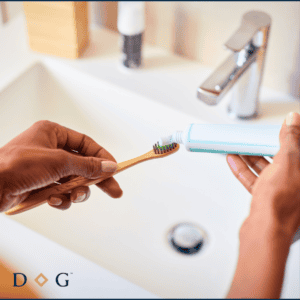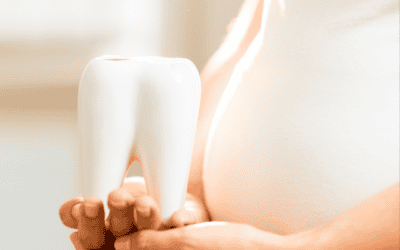Perimenopause and Menopause: Estrogen’s Decline
As women approach menopause, hormonal shifts become more pronounced. The gradual decline in estrogen levels can have a lasting effect on oral health, impacting everything from bone density to gum health.

- Dry mouth (Xerostomia): One of the most common complaints during menopause is dry mouth, caused by the decrease in estrogen levels. Saliva production can slow down, leaving the mouth dry and more susceptible to tooth decay, gum disease, and bad breath. Women experiencing dry mouth should stay hydrated and consider using products recommended by a dentist.
- Gum sensitivity: lower estrogen can make gums more inflamed leading to sensitive and bleeding gums.
- Burning Mouth Syndrome: experienced by some women, this is a burning sensation in the mouth, which cannot be attributed to any other cause (other causes can be vitamin deficiencies).
- Altered taste: taste disturbances can occur
- Osteoporosis: one of the dentist’s main concerns are the medications used to treat patients with osteoporosis. This can have implications if teeth need to be removed as it can result in a condition called Medication Related Osteonecrosis of the Jaw (MRONJ).
- Find out more about osteoporosis prevention at Healthy Bones Australia

What is MRONJ?
Medication Related Osteonecrosis of the Jaw (MRONJ) is a rare but serious condition which can occur when exposed bone does not heal properly in a person taking certain medications. One of these classes of medications are known as bisphosphates, which are commonly prescribed for osteoporosis. These include drugs such as alendronate (Fosamaz), risendronate (Actonel), Ibandronate (Boniva) and zolendronic acid (Reclast). Another osteoporosis medication that can cause MRONJ is denosumab (Prolia).

These drugs help with osteoporosis as they prevent the bone removing cells from removing bone, therefore increasing bone density. Our bone is constantly remodeling itself – laying down new bone, and resorbing old bone (a bit like our skin). They increase the bone density, in an attempt to counteract the loss of bone density that occurs after menopause.
However, when a tooth is removed, it is removed from the bone. In normal healing, the bone cells will lay down new bone, and resorb the old bone. This is how the socket heals. If this process is interrupted due to these osteoporosis medications, we can end up with sockets that do not heal – MRONJ.
MRONJ can sometimes occur spontaneously, if for example there is trauma to the gum and the bone underneath is exposed – this can happen with ill-fitting dentures, for example.

How to prevent complications
Prevention is always better than cure. It’s ideal to have a full dental examination before starting on these osteoporosis medications. This way, any teeth that may be required to be extracted in the next few years or so, can be removed before starting on the medication. In addition, any teeth which could cause problems can be filled or crowned, to try and prevent them needing to be removed.
In addition, your dentist can work with instigating a preventive programme with you, as more than ever, once on these drugs, it’s important to not need any teeth removed! This may include things like more regular teeth cleanings, or starting on specialised toothpaste formulations.
Tips for Maintaining Optimal Dental Health

- Brush and Floss Regularly: Consistent brushing and flossing are crucial for preventing plaque buildup and keeping gums healthy, especially during hormonal changes. Use fluoride toothpaste and a soft-bristled toothbrush to avoid irritating sensitive gums.
- Stay Hydrated: Keeping hydrated is important, especially during menopause when dry mouth is more common. Drink water throughout the day to keep your mouth moist and help wash away bacteria and food particles.
- Monitor Your Diet: Avoid excessive sugary snacks and drinks that can contribute to tooth decay. Eating a balanced diet rich in vitamins and minerals, including calcium and vitamin D, helps support both bone and gum health.
- Visit Your Dentist: Regular dental checkups and cleanings are vital, as they can help catch potential problems early and ensure optimal oral health.. If you’re going through menopause, inform your dentist so they can monitor your oral health more closely.
Conclusion
Women face unique challenges when it comes to dental health, from hormonal changes to the impact of birth control and aging. By understanding these factors and taking proactive steps to maintain good dental hygiene, women can keep their smiles healthy for life.



